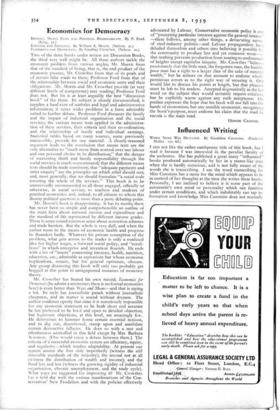Influenced Writing
WHEN NERO Was DICTATOR. By Geraldine Cummins. (Frederick Muller. los. 6d.) I DID not like the rather catchpenny title of this book, but I read it because I was interested in the peculiar faculty of the authoress. She has published a great many "influenced" books produced automatically by her in a trance-like state when she is hardly conscious, and is not fully aware of the words she is transcribing. I use the word transcribing for Miss Cummins has a name for the mind which appears to be in control of her thoughts at the time she writes these books. Personally, I am inclined to believe it is some part of the automatist's own mind or personality which can function under certain conditions, and which indubitably can tap information and knowledge Miss Cummins does not normally possess. This is only a way of describing a very curious i phenomenon, and is n no sense an explanation. It is a 'phenomenon which psychologists should most certainly study -carefully, for it throws light not only upon the functioning of the mind, but upon the whole composition of what we call our personality. In the last few years there have been several publications of the kind, some worthless and some remarkable, such as Winged Pbaroah, by Joan Grant, and The Childhood of Jesus, by Miss Cummins. Not all "influenced" books are valuable, any more than all ordinary books, a fact which points to the same source for both kinds of writing, namely, the automatist's mind. But the matter cannot rest there. How does that part of the automatist's mind gather the information and knowledge which it passes on to the conscious mind? That is the question which is important and interesting, and which psychologists should study. I am supposed to be reviewing a novel and not writing an article about functions of the mind, so I cannot enlarge on this aspect, but only again urge those qualified to do so not to ignore the phenomenon. The book contains passages of real beauty almost worthy, here and there, of its great theme, the ministry of St. Paul during the time when Nero was Emperor. A description of the scene in Paul's upper chamber after he and his followers have partaken of the Cup of Remembrance is curiously moving: "A soft chill air blew through the chamber and the nahlights danced and winked. Then a pale mist enveloped them and their light was dimmed.
"Soon, as little stars dance upon the hill-tops, so did little lights fly to and fro, and the dimness passed. A radiance came out from the rerson of Paul, and slowly it was shaped into the likeness of an angel."
But the whole chapter must be read if its impression of spiritual integration is to be conveyed. An encounter between Paul and Nero when neither was aware of the identity of the other is vividly presented, as is also the scene when Paul is brought before Nero in the Imperial Court. The book has many passages of beauty and interest, and can be greatly enjoyed as an ordinary historical novel without reference to the strange way it has been produced. EDITH LvrrEuroN.























 Previous page
Previous page